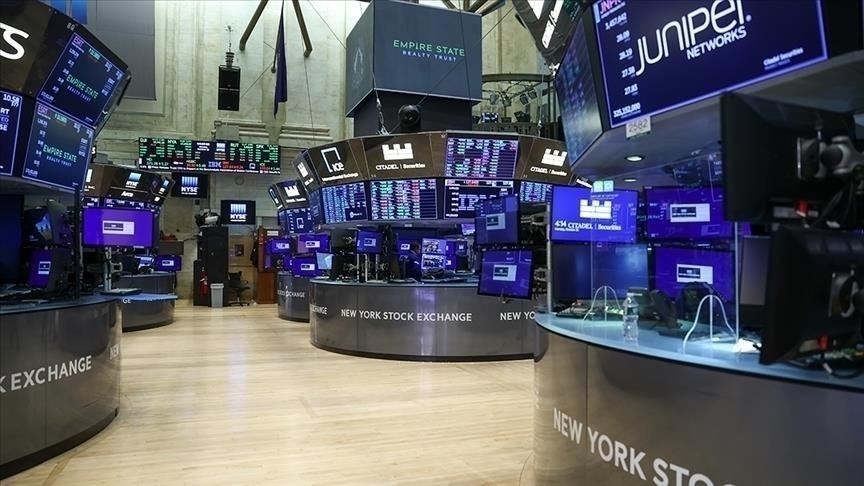The higher-than-expected inflation data announced in the US last week led to increased concerns that the country's central bank would have to raise interest rates more aggressively and drag the economy into recession.
This, combined with the new type of coronavirus (Kovid-19) epidemic measures in China and the ongoing uncertainties regarding the Russia-Ukraine war in Europe, accelerated the flight of investors from risky assets. Although reaction purchases were observed on Friday with the "soft landing in the economy" rhetoric of the US Federal Reserve Chairman Jerome Powell, all these developments caused hard sales in the stock markets throughout the week and the demand for the dollar remained strong.
While it is observed that the new week started with a low risk appetite with the news flow from China, industrial production in the country decreased by 2.9 percent annually, despite the expectations of an increase in April, according to the data released today. Retail sales in the country also fell 11.1 percent year-on-year in April, well below expectations. After the data, the expectations that the slowdown in the country's economy, where the epidemic measures were gradually lifted, strengthened in June.
While oil prices depreciated by more than 1 percent after the data announced in China, India's restriction on wheat exports pointed out that the volatility in the agricultural commodity markets will continue.
On Friday, the University of Michigan consumer confidence index in the USA fell to 59.1 in May, the lowest level since August 2011, but the New York stock market was followed by buyers and the Dow Jones index was 1.47 percent, S&P 500 index was 2.39 percent, Nasdaq technology The index rose 3.82%. Indices, which lost value by an average of 2.5 percent last week, thus closed the 6th consecutive week with a decline.
The dollar index, which tested 105 for the first time since December 2002 last week, completed the 6th week in a row with a rise, and today it continues its 20-year high with 104.5. As investors in search of a safe haven turned to bond markets, the US 10-year bond yield decreased last week after a 5-week increase and stabilized at 2.92 percent.
On the European side, while the effects of the Russia-Ukraine war on the economy continue to be discussed, concerns about the euro and inflationary pressures, which continue to weaken against the dollar, remain at the center of the agenda. In this context, the statements of the European Central Bank (ECB) President Christine Lagarde tomorrow are expected to be decisive on the direction of the markets. Last week, when the volatility in the equity markets was high, the DAX 30 index in Germany rose by 2.1 percent, the CAC 40 index in France by 2.52 percent and the FTSE 100 index in the UK rose by 2.55 percent on Friday. It is noteworthy that the indices closed the week positively with the effect of the rapid rise in question, while the euro/dollar parity is above 1.04 after seeing the lowest level since January 2017 with 1.0350 last week.
While the epidemic measures were gradually slowed down in China across Asia, the data announced that the structural problems in the country's economy continue and the recovery will take time brought about a mixed course in the stock markets. Close to the close, the Shanghai composite index in China fell 0.2 percent and the Kospi index in South Korea fell 0.1 percent, Japan's Nikkei 225 index rose 0.4 percent and India's Sensex index rose 0.8 percent.
In Borsa Istanbul, where reaction purchases were effective on Friday, the BIST 100 index closed the day at 2,419.23 points with a 1.18 percent gain. The index lost 1.6 percent on a weekly basis. After closing last week at 15.4794 with an increase of 3.5 percent compared to the previous week, the dollar/TL is traded at 15.4980 at the opening of the interbank market in the yen week.
Analysts stated that the global data and developments caused concerns about economic growth and inflationary pressures to remain on the agenda, and said that the volatility in the markets may continue for a while.
Analysts stated that this week, along with the G7 Finance Ministers' Summit, and the statements of Fed President Jerome Powell and ECB President Christine Lagarde will be in the focus of the markets, the data agenda is growth and inflation in the Eurozone, inflation in the UK, Producer Price Index in Germany ( He noted that industrial production and capacity utilization will come to the fore in PPI) and the USA.
Analysts stated that today, the balance of payments in the country, the foreign trade balance in the Eurozone abroad and the New York Fed manufacturing index in the USA will be monitored, and that technically, the level of 2.350 in the BIST 100 index is support and 2.470 points are in the resistance position.
Economists participating in AA Finans' survey expect the current account to have a deficit of 5 billion 350 million dollars in March. The current account deficit expectation of economists for the end of 2022 was realized as 38 billion 279 million dollars.
The data to be followed in the markets today are as follows:
10.00 Turkey, balance of payments for March
11.00 Turkey, April budget balance
12.00 Eurozone, foreign trade balance for March
15.30 US, May New York Fed manufacturing index









Comments
No comment yet.